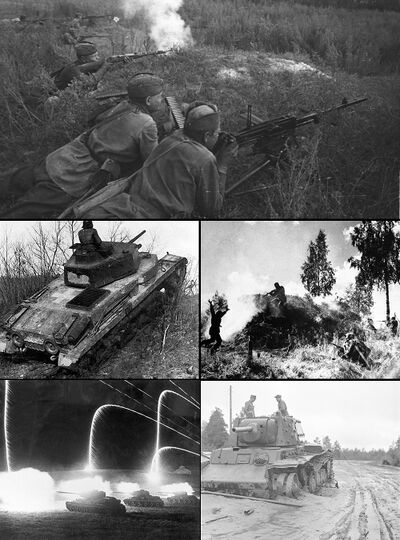Northern War
| Northern War | |||||||
|---|---|---|---|---|---|---|---|
 Clockwise from the top: Kolodorian infantry in 1939; Letnian troops surrender; Letnian armor in the mud; Letnian armored forces in 1943; Kolodorian armor on maneuvers | |||||||
| |||||||
| Belligerents | |||||||
|
Cherniya |
| ||||||
| Commanders and leaders | |||||||
|
|
| ||||||
| Strength | |||||||
|
| 5.3 million | ||||||
| Casualties and losses | |||||||
|
2.5 million killed 3.9 million wounded |
1.8 million killed 3.2 million wounded | ||||||
The Northern War (Letnian: Северная война, Severnaya voyna, Kolodorian: Ziemeļu karš) was a war between Letnia and the Confederation of Kolodoria. The war began on 11 April 1939 when Letnia invaded Jedoria following a series of territorial disputes between Kolodoria, Letnia, and Cherniya.
The War of Sylvan Succession had altered the balance of power in Septentrion, especially in Casaterra where Letnian strategic interests were primarily focused on. Beginning in the 1920s the slow but steady modernization of Kolodoria had caused concern within the Letnian government whom feared a regional power on it's western borders could potentially divide Letnian attention from Casaterran affairs. In particular Turov was worried that Koldoria would come under the influence of another major power, potentially forcing the Empire to face prospective threats on two fronts. As tensions in Casaterra began to rise the Empire began approaching Koldoria with negotiations to establish further friendly relations, however this was complicated by ongoing territorial disputes between Kolodoria and Cherniya, a long time Letnian ally. Despite several months of negotiations no agreement was reached to Letnian frustration. Making matters worse, Salhar proceeded to interpret the entire event as a Letnian desire to dominate Kolodorian affairs and began making inroads with other major powers in Septentrion. The outbreak of the Pan-Septentrion War convinced Letnian leadership of the necessity of securing it's western frontiers and it was decided that a punitive military expedition would be launched under the auspice of securing Cherniyan territorial claims. It was also hoped that a demonstration of Letnian military might would deter any potentially hostile state from involving Letnia further in the PSW.
On 11 April 1939 the Letnian Imperial Army launched Operation Gregori and invaded Kolodoria. After some initial success the Letnians began to falter as Kolodorian resistance stiffened, and after six months of fighting Letnian forces were forced out of Kolodoria. The Royal Confederate Army subsequently launched an invasion of Cherniya and western Letnia in early 1940, pushing deep into western Letnia and eventually reaching the city of Svoborovo. Heavy fighting continued until Letnian forces in the east were freed up after events in Casaterra rendered the threat of an invasion of Letnia moot, and backed up by a reorganized military structure proceeded to force back Kolodorian forces. Both sides traded major offensives as Letnian superiority in manpower and industry successfully pushed Koldoria back across the entire front. By 1944 Kolodorian economic woes began to seriously undercut it's ability to wage war, and after a series of decisive defeats in the spring Kolodoria sued for peace.
Kolodoria was forced to cede the Voronezh Coastal Plain to Cherniya and agreed to demilitarize it's side of the border for a period of ten years. Internally the war had far reaching effects; the poor performance of the Letnian Imperial Army resulted in major changes to the structure and organization of the Letnian military, and the experience of the conflict influenced many writers and artists for decades to come. The war had a more drastic influence in Kolodoria: as a still developing and modernizing state the Confederation was unable to shoulder the financial burden of the war, and the ensuing peace was dominated by economic and financial trouble. The war is widely seen as a major cause for the Kolodorian Revolution a decade later in 1954, which resulted in a communist overthrow of the Confederation and the establishment of the Socialist Republic of Kolodoria.